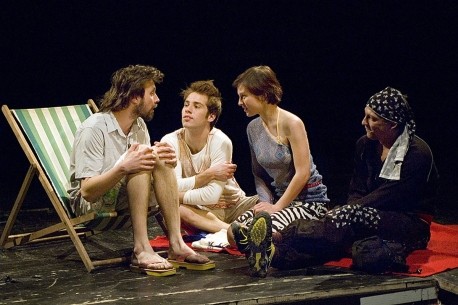|
Academy For Theatre, Radio, Film And Television
The Academy of Theatre, Radio, Film and Television ( sl, Akademija za gledališče, radio, film in televizijo or AGRFT) is an academy of the University of Ljubljana in Ljubljana, Slovenia. It is the only college and graduate school in Slovenia with a similar curriculum. It is composed of three colleges: the College for Theatre and Radio, the College for Film and Television, and College for Screen and Play Writing. In addition, a Center for Theatre and Film Studies is included in the academy. The current dean is Aleš Valič. History The academy was founded in 1945. At the beginning, it was only an academy for theatre. Gradually, the sections for radio, film and television studies were added to the curriculum. In 1963 the academy adopted its current name. Since 1975 it has been an autonomous member of the University of Ljubljana, along with the Academy of Music and the Academy of Fine Arts and Design.Benedetič, Ana and Šelih, Alenka (1989) ''Zbornik Ljubljanske Univerze'' Univerza ... [...More Info...] [...Related Items...] OR: [Wikipedia] [Google] [Baidu] |
University Of Ljubljana
The University of Ljubljana ( sl, Univerza v Ljubljani, , la, Universitas Labacensis), often referred to as UL, is the oldest and largest university in Slovenia. It has approximately 39,000 enrolled students. History Beginnings Although certain academies (notably of philosophy and theology) were established as Jesuit higher education in what is now Slovenia as early as the seventeenth century, the first university was founded in 1810 under the ''Écoles centrales'' of the French imperial administration of the Illyrian provinces. The chancellor of the university in Ljubljana during the French period was Joseph Walland (a.k.a. , 1763–1834), born in Upper Carniola. That university was disbanded in 1813, when Austria regained territorial control and reestablished the Imperial Royal Lyceum of Ljubljana as a higher-education institution. Quest for a national university During the second half of the 19th century, several political claims for the establishment of a Slovene-language u ... [...More Info...] [...Related Items...] OR: [Wikipedia] [Google] [Baidu] |
Josip Vidmar
Josip Vidmar (October 14, 1895 – April 11, 1992) was a notable Slovenian literary critic, essayist, and politician. From 1944 to 1946 he was speaker of the Slovenian People's Liberation Council (Slovenian Parliament). From 1952 to 1976 was president of the Slovenian Academy of Sciences and Arts, and from 1950 to 1964 he was the head of the academy's Institute of Literatures. Life Vidmar was born in Ljubljana, in a progressive middle-class family. Josip had an older brother, Milan Vidmar, a notable engineer, chess player and writer. Their sister Meta Vidmar studied with the famous Mary Wigman in Dresden and upon returning to Ljubljana in 1930 established the first school of modern dance in Slovenia. He completed gymnasium school in Ljubljana and studied at the Czech Technical University in Prague. During the World War I he fought in Austria-Hungarian units on the eastern front but deserted to Russian side. Anti-Yugoslavization writings At the time when in the ex- Austrian Li ... [...More Info...] [...Related Items...] OR: [Wikipedia] [Google] [Baidu] |
Educational Institutions Established In 1945
Education is a purposeful activity directed at achieving certain aims, such as transmitting knowledge or fostering skills and character traits. These aims may include the development of understanding, rationality, kindness, and honesty. Various researchers emphasize the role of critical thinking in order to distinguish education from indoctrination. Some theorists require that education results in an improvement of the student while others prefer a value-neutral definition of the term. In a slightly different sense, education may also refer, not to the process, but to the product of this process: the mental states and dispositions possessed by educated people. Education History of education, originated as the transmission of cultural heritage from one generation to the next. Today, educational aims and objectives, educational goals increasingly encompass new ideas such as the Philosophy of education#Critical theory, liberation of learners, 21st century skills, skills needed fo ... [...More Info...] [...Related Items...] OR: [Wikipedia] [Google] [Baidu] |
Media Studies
Media studies is a discipline and field of study that deals with the content, history, and effects of various media; in particular, the mass media. Media Studies may draw on traditions from both the social sciences and the humanities, but mostly from its core disciplines of mass communication, communication, communication sciences, and communication studies. Researchers may also develop and employ theories and methods from disciplines including cultural studies, rhetoric (including digital rhetoric), philosophy, literary theory, psychology, political science, political economy, economics, sociology, anthropology, social theory, art history and criticism, film theory, and information theory. Origin Former priest and American educator, John Culkin, was one of the earliest advocates for the implementation of media studies curriculum in schools. He believed students ought to be capable of scrutinizing mass media, and valued the application of modern communication technique ... [...More Info...] [...Related Items...] OR: [Wikipedia] [Google] [Baidu] |
Drama Schools
A drama school, stage school or theatre school is an undergraduate and/or graduate school or department at a college or university; or a free-standing institution (such as the Drama section at the Juilliard School); which specializes in the pre-professional training in drama and ''theatre'' arts, such as acting, design and technical theatre, arts administration, and related subjects. If the drama school is part of a degree-granting institution, undergraduates typically take an Associate degree, Bachelor of Arts, Bachelor of Fine Arts, or, occasionally, Bachelor of Science or Bachelor of Design. Graduate students may take a Master of Arts, Master of Science, Master of Fine Arts, Doctor of Arts, Doctor of Fine Arts, or Doctor of Philosophy degree. Entry and application process Entry to drama school is usually through a competitive audition process. Some schools make this a two-stage process. Places on an acting course are limited (usually well below 100) so those who fare best ... [...More Info...] [...Related Items...] OR: [Wikipedia] [Google] [Baidu] |



